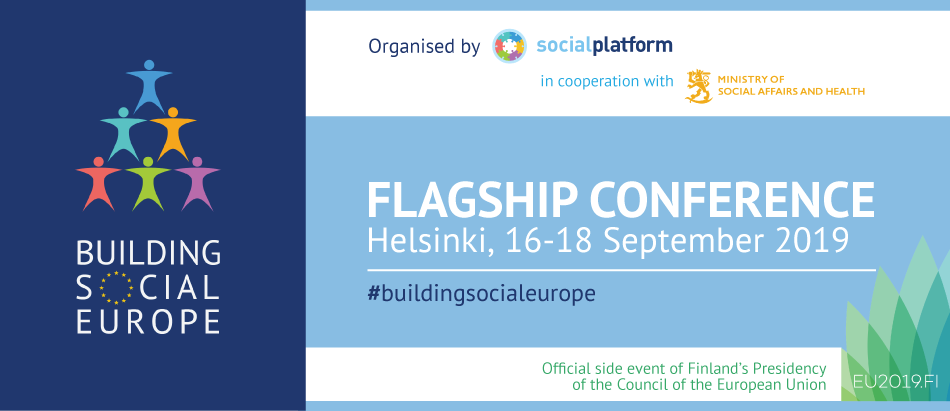
Following a series of panels, thematic workshops, study visits and a high-level round table with national government representatives including the current and forthcoming EU Presidencies, the 150 participants of our Flagship Conference put forward the following recommendations on an economy of wellbeing approach that leaves no one behind:
The Economy of wellbeing encompasses a long-term approach, that…
- Looks at the impact of decisions and policies on people’s lives.
- Is based on a participatory governance structure.
- Ensures socioeconomic and environmental justice for all.
The Economy of wellbeing looks at the impact of decisions and policies on people’s lives
Our six thematic workshops led to the following recommendations, which, if fully implemented, will bring concrete changes in people’s lives throughout Europe.
The economy of wellbeing starts at work
- Decent and adequately remunerated work is a precondition of wellbeing.
- We request a framework directive on adequate minimum income.
- We insist on the added value of social economy enterprises and cooperatives as they put people first before profits.
- We expect ‘An economy that works for people’ dimension to be spelled out in the action plan for implementing the European Pillar of Social Rights (‘Social Pillar’).
Ensuring health equity and social justice in Europe
- We insist on the need to reframe the discussion on the goals of the economy. GDP is currently the main indicator used to assess wellbeing. But, according to analysis by the WHO, GDP shows no relation to health equity.
- We propose a health equity impact assessment to be introduced in the European Semester process. This could be used to assess the impact of country specific recommendations on health inequalities.
- This impact assessment could be based on the WHO Health Equity Policy Tool with the five following essential conditions: 1) investment in health services, 2) income security and social protection, 3) investments in living conditions, 4) investment in social and human capital, 5) employment and working conditions.
Fighting homelessness in Europe
- We call for the right to housing and assistance for the homeless (based on article 19 of the ‘Social Pillar’) to be implemented at EU level. Enhanced monitoring, policy guidance and investment should be the cornerstones of an ambitious EU-level action on homelessness under the future Commission.
- All Member States should also develop integrated strategies to tackle homelessness. ‘Housing First’ in Finland is an inspiring practice: this policy establishes the right to housing and includes a person-centred approach to support according to individual needs.
Ensuring long-term care in Europe
- We need to implement principle 18 of the Social Pillar through a European strategy on long-term care with a holistic and lifecycle approach, including a European platform to share good practices, improved data collection with harmonised definitions, indicators and corresponding European targets to assess the affordability, accessibility, quality and availability of long-term care services.
- We call for an increase of the overall funding for person-centred long-term care to ensure innovation, high quality services and self-determination for persons in need of care.
- We ask for the recognition of family/informal carers including social protection, right to choice and work-life balance; and for investment in carers’ human capital, skills’ development, training and peer support.
Funding community-based social services in Europe
- Public procurement is not the appropriate tool to fund community-based person-centred care services.
- We need to promote alternative models that support the development of flexible, partnership-based services, aimed at cohesion in society, such as reserved markets and personal budgets, which help service providers to better cater to users’ needs. We ask the Commission to encourage Member States to use these alternatives, instead of public procurement.
- We need to shift the focus from quality of care to quality of life for people with support needs and wishes.
Funding a long-term comprehensive approach to migrant inclusion in Europe
- We ask EU, national and local authorities to invest in long-term integration policies.
- Such policies need to focus on people’s potential and allow for their personal ambitions or life projects to be fulfilled, including self-determination – going beyond the label of being a ‘migrant’.
- We insist that governments ensure integration from day one, include a person-centred approach encompassing wellbeing, and involve migrants in the decision-making process on interventions that concern them.
The Economy of wellbeing is based on a participatory governance structure
- We ask for the involvement of civil society organisations, in all stages of the EU decision-making process – including the design, implementation and monitoring of policies and legislation – to ensure decisions are based on the impact they have on people’s lives.
- We call the future Executive Vice-President of the European Commission for ‘An Economy that Works for People’ to go beyond engaging only in social dialogue and to establish a structured relationship with civil society organisations to ensure that all decisions and policies are based on their impact on people’s lives.
- We insist that the future Vice-President for ‘Democracy and Demography’ actively involves civil society organisations, right from the beginning of her mandate, in the development, contributions and follow-up to the Conference on the Future of Europe.
The Economy of wellbeing ensures socioeconomic and environmental justice for all
- We ask for social inclusion, tax justice and environmental sustainability to be recognised by EU institutions and member states as core objectives of the future EU post-2020 strategy, including in economic, monetary and tax policy reforms.
- We also insist that, to take stock of social developments at EU level and to monitor the implementation of the European Pillar of Social Rights and the Agenda 2030, Members States, led by the current and upcoming presidencies, in partnership with EU institutions, organise an annual social summit, in which civil society organisations are engaged.
